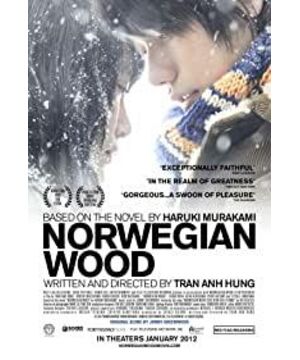There is no intermediary for the original "Norwegian Wood" in the city. Mediators that receive context. That's why we're always so picky when we accept a movie that's based on a novel. Not to mention the intermediary of translators. Or we shouldn't be too hard on Chen Yingxiong - he may not have the same context in which we accept "Norwegian Wood", he accepts another "Norwegian Wood". He didn't mean to disappoint us.
Yet our experiences and impressions through countless intermediaries are so direct, like they are part of us. After watching "Norwegian Wood" and walking out of the theater, I couldn't tell what was wrong with my whole body: what did I owe? I suddenly discovered that there is no Japanese street scene in the 60s and 70s in the whole film, as if there is not a single shot of being in the street. Contrary to the collective identity in Hong Kong that accepted "Norwegian Wood" as "urban sensibility" in the 1990s, there is no urban city in Chen Yingying's "Norwegian Wood".
Compared with the urban landscape, Chen Yingying prefers to use the natural landscape to convey the inner feelings of the characters. What I felt in it was a perceptual tradition since romanticism: the correspondence between human beings and nature, the emotion in the scenery, the loneliness in the snow, the tranquility in the woods, and the throbbing in the wind... Some critics believe that the film can deeply convey the characters. It is probably because the natural landscape can amplify the concentration and intensity of emotions. In my opinion, this mode of correspondence between emotions and scenes just misses the core of Haruki Murakami's urban sensibility: alienation.
Lewis in 1938. Louis Wirth proposed three definitions of "urban": 1. a large population; 2. a dense settlement; 3. the heterogeneity of individual and group life. To put it simply, a large number of heterogeneous populations live together in one place, causing the group to form a new type of social interaction (different from the rural-style interaction that relies on closer relationships such as relatives and neighbors). In the eyes of other sociologists, this gives urbanites a "closeness to conversing with others," which leads to "a certain kind of gentle demeanor," but Worth argues that urbanite encounters are non-personal, Superficial, ephemeral and fragmentary, "the urbanites' appearance of reservation, indifference and boredom in their relationships can therefore be seen as a means of shielding oneself from private requests and the expectations of others. Urban dwellers require too many interactions. , like the co-passengers of a bus, it is impossible for everyone to know each other. Worth believes that the interactive characteristics of the city are superficiality and anonymity. This paradoxically leads to advantages and disadvantages. On the one hand, individuals can travel by surfacing and anonymity, and escape from any obligations and expectations that arise from living in a tightly controlled community; on the other hand, when urbanites are freed from traditions, ties, and restraints, they also lose their participation in community life. feeling, including the loss of the ability to feel part of a community and relate to others. For Worth, cities thus disorganize social life. Doreen Marcy et al., eds. In "City. City World", Worth's point of view is extended, and it is said that the city is full of contradictions and tensions: it liberates and suffocates the individual; there is excitement and excitement, and there is lifelessness; Density magnifies these kinds of contradictions. (Note)
It seems to me that Haruki Murakami's urban alienation sensibility arises entirely from the above-mentioned academic theory (although in fact it is not). Urban sensibility is a reserved attitude, indifference and boredom, and an extremely sensitive heart, and is accustomed to self-isolating from external sensitivities to maintain or communicate oneself. For example, "Norwegian Wood" begins when the narrator Watanabe is thirty-seven years old, and he goes back and remembers the steppe where he spoke to Naoko eighteen years earlier. Although the narrator can describe the scenery and touch of the grassland very clearly, he is quite sure that because he was busy with complicated love affairs at that time, he had no intention to pay attention to everything around him. And the behavior of the characters does not correspond to the beautiful grassland scenery. Naoko describes a well to Watanabe on the beautiful October grassland. It is extremely dark and deep, symbolizing death. In other words, Murakami still adopts an inappropriate logic when giving natural scenes to events. When Ah Lu was angry and ignored Watanabe, Watanabe fell into complete loneliness. Murakami wrote that the pain of loneliness is also a kind of pain that does not correspond to the softness of the late spring and the fragrance of the wood lotus in the evening. way: beautiful on the outside, pain on the inside). Even in extreme pain, Watanabe wrote only beautiful and pleasant things in his letters to Naoko - this is a reserved habit that has been deeply rooted in the heart, not based on personal will, and it is precisely this that constitutes the city. The self of young Watanabe.
Watanabe returned from a painful homeless trip and called Alu from a street phone booth. Alu asked him where he was. He was in the vast street, and the crowd was passing by outside the glass. Watanabe had no idea where he was (geographical and social Of course), he can only prevent the disappearance of self by calling on a lover who symbolizes vitality. The last phone call scene is totally unacceptable without a city street scene. No metropolis, no speed, no emptiness.
The cities are separated and unprovoked. In the original, Watanabe and Alu reconcile and confirm their intimacy in the back of a video game center. This location is entirely a distraction-oriented (reader) subsection rather than a scene with special meaning, and this kind of meaningless The contingency of the film just constitutes the characteristics of the city, and it also forms the background for the love between Watanabe and Alu Fubing; but in the film, the pure snow scene becomes a simple love show. Murakami is in the opposite situation, and Chen Yingying is in the same situation. The pain at the beach has been so intensely exaggerated that Kenichi Matsuyama's tears and snot have been pulled for as long as Yin Tianqiu's acting skills in "The King of Comedy", but he still felt that something was wrong. Looking at the original book, ah, it turns out that Watanabe has gone through a long wandering in various cities, he can't remember where he has been, but he has to sleep crazily in a strange place, such a kind of detached self-healing process - only this kind of healing process can be presented. That form of pain: a kind of pain with a mixed sense of alienation, pain in the fact that one cannot directly express one's feelings.
Not only is there a lack of perceptualness, but also a lack of understanding of values. As Worth said in the above quote, the alienation and isolation of the city is the key to maintaining personal space and self. Chen Yingxiong's "Norwegian Forest" is not a narrative from Watanabe's point of view. We can't see Watanabe who has reservations and is reluctant to express his position but insists on himself. Watanabe observed them by keeping a distance from the student activists, and sharply criticized them as those who wanted to strike and ensure that their grades did not fall, and they were rudderless. Watanabe, on the other hand, decides whether to take classes or not according to his own judgment, does not participate in the group, and is not even afraid of being isolated. The loneliness of the original book is based on disapproval of the mainstream of society as a whole, while the loneliness of the film seems to end only when the loved one is not around. In this sense, Chen Yingxiong vulgarizes Haruki Murakami in an aesthetic way.
Note: See Doreen. "The Urban World" edited by Marcy et al., translated by Wang Zhihong, Taipei: Qunxue Publishing Co., Ltd., 2009, pp. 43-50. P.S. Obsolescence
of Norwegian Forests
More than 20 years ago, Haruki Murakami's work "Norwegian Forest" (hereinafter referred to as "Norway") was published, causing a sensation, setting off a wave of sensibility in the market and affecting several generations of young people. In Japan, one out of every four people has read "Noh". Last year, "Reading Good" once held a special edition on the 20th anniversary of "Norway". The cultural people talked about this book, and many collective memories can be seen in it. This year, the film version of "Norway" directed by Chen Yingxiong was released and received little praise. As someone who has also been influenced by "Nuo", I also have to sigh to discover that "Nuo" may really be outdated.
I once talked to an 18-year-old clerk in a bookstore that focuses on cultural and artistic consumption about her feelings about "Norway". She has a mushroom head, thick-rimmed glasses, a green plaid shirt, and likes elegant and meticulous stationery. She is a typical literary girl. For her, the movie is boring, like a summary of a novel, without surprises. What is surprising is that she said that although she found her own shadow in it, the message about death in it was too heavy, and she still liked "Kafka on the Shore". Back then, many cultural critics thought that the death and loneliness discussed in "Norway" were superficial and could not be compared with classic literature. It turned out that the new generation of taste and affordability has been completely different.
What is even more surprising is the phenomenon of Japan's current "herbivore generation". It turns out that among Japanese men and women aged 16 to 49, 17.7% of Japanese men and 48.4% of Japanese women are "not interested" or "disgusted" with sexual behavior; the proportion of "asexual couples" who have not had sex for a month is as high as 40.8% , the reasons are "it is natural after giving birth", "feel troublesome", "work is very tiring", etc. Couples who find sex troublesome is an extension of the coldness of interpersonal relationships. Simply put, they feel that it is troublesome to deal with others. "Norway" was famous for its extensive sexual descriptions in those days. It is a common sense imagination that men and women who are empty in the city rely on their bodies and intimacy to relieve their loneliness. But the new "herbivore generation" believes that falling in love and going to bed is a waste of time and money, even if there is a need for sex, there is no need to find a partner, because you can play with sex toys or have sex online at any time. It turns out that Japan, as an AV kingdom that exports sexual imagination, its reality is a sexless country.
It turns out that even the sexual turmoil of youth and the pursuit of love will become obsolete one day.
View more about Norwegian Wood reviews










